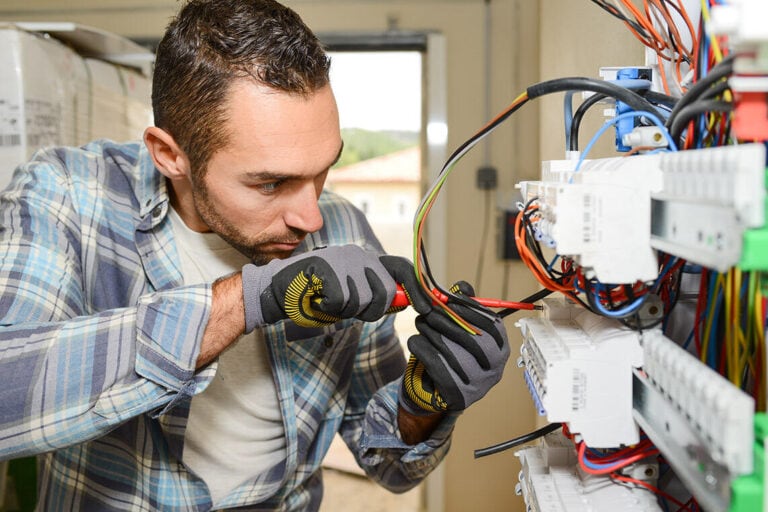Electricians carry a skill set that is essential for us who are living the modern life to proceed with our day-to-day lives efficiently, comfortably, and safely. Electricians are skilled and specialize in installing, repairing, maintaining, and supplying electrical wiring systems in both commercial and residential areas. They are capable of trade professionals who are trained to address different kinds of concerns regarding electrical power and equipment. And because of the technical knowledge and experience required and the risks that electricians are in, there is a list of strict qualifications that one must first accomplish, and extensive training that one must first undergo to become an electrician and be part of this field of profession. Moreover, to grow and to become an expert in this line of work, further training and experience are necessary.
In the field of electricians, there are different categories that people can be classified into depending on their licensing and experience:
- Journeyman Electrician
The basic level in the categories of electricians is the journeyman electrician. People continue their education and improved their skills to move on to a higher level such as a master electrician, although for some, it is their final goal. Becoming a journeyman electrician means a person has finished apprenticeship or has gone to a trade school or community college, has worked a specific number of hours, and has already become licensed. A journey electrician is capable of doing jobs independently. They are completely trained and can work on all types of installation, maintenance, and electrical design. But journeymen electricians cannot train apprentices (although this may vary), pull permits for electrical work, or lead a job site. The requirements to become a journeyman electrician may also vary depending on the state.
- Master Electrician
From being a journeyman, after acquiring a certain number of years of experience depending on a state and by complying with specific requirements that can also vary depending on the state, and by passing an exam, one can become a licensed master electrician. People who become master electricians have acquired years of experience, a deep understanding of the job, and a strong skillset from being a journeyman electrician for years which enables them to train apprentices, lead an electrical crew, and direct projects. Becoming a master electrician also brings high salary projects, job security, and an opportunity to work as an electrical contractor.
- Electrical Contractor
Electrical contractors are electricians who are business owners. They can be employed to install, maintain, and design electrical systems from different types of buildings such as industrial, residential, and commercial buildings. To become an electrical contractor, there is a specific level of insurance, training, and licensing requirements required, which can take years. Electrical contractors can work alone or hire teams to accomplished jobs, and it is required for one to be a master electrician himself/herself or to have one in their crew. Also, some electrical contractors have their programs to train apprentices. Electrical contractors also received one of the highest salaries in their line of work. To become an efficient and effective electrical contractor, using and utilizing project management software like Pro Crew Schedule will be a great help. With this software, it will be easier to manage tasks, to perform task tracking, to create timelines for projects, and to form crew schedule. Other than these, there are plenty of things that project management software such as Pro Crew Schedule can accomplish which can better the jobs of electrical contractors.
In the field of electricians, there are also different types that people can be classified into depending on their specialization:
- Inside Wiremen
Inside wiremen are the types of electricians who do jobs on industrial or commercial structures. Inside wiremen install fire alarms, lighting, security systems, and new wirings. They also power motors and different systems such as HVAC and maintain a building’s power system after it is built. In addition, they also strategize power distribution within projects and set up temporary power during the construction phase.
- Outside Linemen
Outside linemen work outdoors and under risky conditions most of the time. Their job is in connection to electrical power systems that are on utility poles, underground, and above-ground. Also, they are often climbing poles or on bucket trucks because of their work. They are also the ones who maintain and install electricity distribution lines that provide electricity coming from a power plant to the commercial buildings and residences.
- Telecommunication Technicians
The job that telecommunication technicians perform does a huge favor to all of us. Telecommunication electricians work on systems related to telecommunication, and they often work together with inside wiremen. They install systems such as access control systems and security systems. Furthermore, they install different types of multimedia circuitry and other low voltage wirings inside structures such as telephone lines and computer cables.
- Residential Wiremen
Last but not least is residential wiremen. Plenty of electricians start their profession by becoming residential wiremen. Residential wiremen are the electricians who install the wirings and electrical systems on family units and private houses that are on the process of being built, and they also maintain the wiring in houses that have already been built. Residential wiremen also need to follow and to be careful about local power regulations and state and local electric codes for them to do their jobs correctly.
The Process to Become an Electrician
- Research
The first step that one should take in becoming an electrician is research. People who are interested in becoming an electrician must first research about the profession and the duties for them to know what the job is really about, and what is the work that they will need to do when they become an electrician. By taking this step, they will also be able to better assess themselves to make sure that it is really what they want to do before taking further steps.
- High school Diploma or an Equivalent
In becoming an electrician, there are school subjects that can provide valuable skills that can help a person to accomplish his/her work more efficiently and effectively. These subjects include physics which provides basic scientific concepts that electricians need for them to accomplish their job effectively, algebra and trigonometry which equips a person with the mathematical skills that can be used in calculating the force of electrical currents, the length of wirings, and the angle of circuits, mechanical drawing, chemistry, geometry, accounting, business, etc. which can all be of use to a person who wants to become an electrician or to work in the electrical field.
- Trade or Technical-Vocational School
By acquiring a certificate, diploma, or degree, a person will become more equipped with the necessary skills and experience through the training that he/she underwent in school. Also, acquiring formal education provides an introduction and a foundation that can give a person an advantage when applying for apprenticeships. Furthermore, almost all states permit students to substitute some of the hours that they consumed when they are undergoing formal education for the hours of experience necessary for them to acquire a journeyman license. In addition, plenty of the programs also provide almost half of the hours demanded one to become a licensed journeyman.
- Apply for Apprenticeship
Apprenticeship is one of the requirements for one to become a licensed electrician. When applying for an apprenticeship, there is a high chance for one to be requested to undergo a job interview, to meet certain physical requirements, and to take a drug test. One may also be asked to accomplish an aptitude assessment which will test one’s mathematical skills and reading comprehension. To find an apprenticeship, one can look through a trade school which offers job placement opportunities and apprenticeship, through organizations such as the National Electric Contractors Association (NECA), the International Brotherhood of Electrical Workers (IBEW), the Independent Electrical Contractors (IEC), and through other unions and non-unions. Also, when looking for an industry-sponsored apprenticeship, one can check the Office of Apprenticeships Sponsors website.
- Register as an Apprentice
After applying for an apprenticeship, depending on the state, one may need to first register as an electrician apprentice for them to be permitted to work on electrical job sites.
- Finished the Apprenticeship
Apprenticeship is the nucleus of the training process in becoming an electrician. Plenty of states demand that one finishes four years of apprenticeship at the least before taking the exam. Apprenticeship is a mixture of classroom knowledge, experience from the on the job training, and guidance and mentorship of master electricians who are the experts in the field. Furthermore, apprenticeship will include training on topics such as making certain that every work is accomplished per regulations of the nation, state, and locality, interpreting construction blueprints and technical diagrams for electrical plans, operating special tools to check and examine electrical systems for problems, placing, maintaining, and fixing electricity-distribution equipment and electrical wiring, etc.
- Study for the Examination
After finishing an apprenticeship, one will need to study the national code for electricians to pass the test and to obtain a license.
- Become Licensed
To become a licensed electrician, one should pass the examinations involving common electrical theory and knowledge, and the National Electrical Code. Although, after passing the test and becoming licensed, one will need to continue pursuing courses regarding the field to keep up with the National Electrical Code adjustments.
The path and the steps that should be taken to become a licensed electrician is not swift and simple. It requires time and effort to reach the goal. It also does not end in acquiring a license because constant education is necessary to deliver the right and effective services in compliance with the regulations. But with dedication and one’s own will, aspiring electricians will surely reach their objective and be able to continue further.
o.





